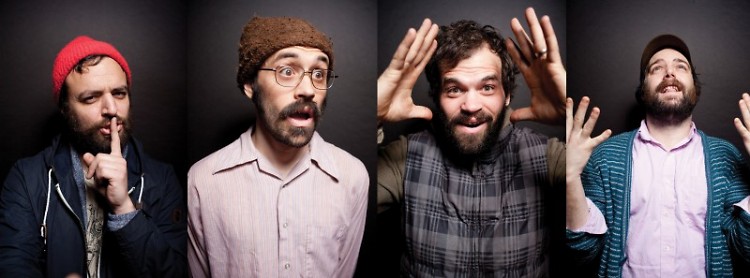mewithoutYou is coming to Calvin’s Covenant Fine Arts Center on September 29 at 8 p.m. Over the last 12 years, the Philadelphians have carved a strange niche for themselves within the indie music world. They self-released their most recent album "Ten Stories," but spent the majority of their career on alternative Christian label Tooth & Nail Records, the implications of which they are still negotiating.
They play with their souls on their sleeves. The combination of extreme musical aesthetics and an intense lyrical asceticism manifests in their live performance as a stormy sea, both raucous and seamlessly coherent. It's clear they have played together a long time, and have know each other even longer.
I spoke with Greg Jehanian, mewithoutYou’s bassist, about their niche and its transcendence.
Steven Edelman: mewithoutYou's music is striking, both lyrically and musically. Initially, the content of both, along with your label, put you within a sort of hardcore/noise/punk Christian genre. How conscious of a decision was this at the time?
Greg Jehanian: None of us grew up aware of the fact that there was a subculture of Christian music. We were simply creating music that was influenced by the [punk, shoegaze and Brit pop] bands we grew up listening to. All of which, I think, come through in the music we create. I think that signing with Tooth and Nail created an association with Christianity that wasn't necessarily intentional on our part. So in a way, finding ourselves in that niche sort of happened to us, and wasn't a conscious path we were making for ourselves.
SE: How comfortable were/are you within this genre?
GJ: I always thought it a bit strange to label music, or any art for that matter, as "Christian." I understand that, as humans, we want to categorize things to help us contextualize and understand them. However, I've never been comfortable with being called a Christian band. I've always understood that more as a marketing term and having little to do with the creative process, which I've found to be a very life-giving, sacred space.
SE: You seem to be challenging your place within this genre with the integration of Sufi lyrics and new musical moves...how conscious of a decision was this shift; what inspired this shift?
GJ: We've never been a band that consistently writes songs until there's enough material to record an album. Instead, we carve out a two month period, get together five days a week, and see what comes out of that time together. That being said, most of our shifts from album to album, both musically and lyrically, were not super intentional. Because of the way we write records, each effort from our perspective intensely reflects what's happening in our lives at the time. I like to think of each album as a celebration and reflection of a specific time in our lives.
SE: Has this genre been difficult to transcend?
GJ: I think it has been difficult because no matter how you perceive what you create, or how you would choose to categorize it, once you create it and let it go it's no longer yours. People are going to categorize you the best way they know how, even if that means consistently calling you a Christian band. I do the same thing with the music I listen to. That's the beautiful thing about creating: you never truly own what you create. Once others experience it, internalize it and process it, it becomes something completely different.
SE: How much do you consider your fanbase as you experiment and change lyrically and musically?
GJ: I don't think we consider them much at all when it comes to what direction we're going to take a record in. I don't mean that disrespectfully. We are very, very grateful for our fans. They've been very loyal and consistent through the years. But there's a trust in that relationship. When we get together to create, we make what feels truest to us at the time. If people respond to it, that's great! If they don't, well that's great too!
SE: What have been their reactions?
GJ: I think with each record we've made, people's reactions have been mixed. We try not to make the same album twice, while still remaining true to the band's sound. People are going to relate to a certain album over others, which I totally understand. Because of that, we as listeners tend to want more of what initially struck a chord with us, but I think that allowing ourselves to grow with a band can be a rewarding process.
SE: Over your career, what has been the biggest creative/experimential leap of faith you've taken?
GJ: I would say our last album "It's All Crazy..." was our biggest creative leap of faith. Traditionally, we write a group of instrumental songs that Aaron later puts lyrics to, and we eventually craft an album. I think that way of writing works well for us. Because of various factors, including what was happening in our individual lives at the time, we approached our writing for that record differently. We did use a handful of the instrumentals that we wrote, but we also built arrangements around a few stripped down acoustic songs that Aaron brought to the band. This felt right at the time, and we were excited about what we had created. It was different for us, and we anticipated mixed reactions to the album, which there were. But when all was said and done, it felt like an honest album that reflected our lives at that time.
SE: Finally, how hard are you gonna rock Grand Rapids?
GJ: I think it's safe to say it will probably be the best live show that's ever happened in the history of live music....no comment.
The Rapidian, a program of the 501(c)3 nonprofit Community Media Center, relies on the community’s support to help cover the cost of training reporters and publishing content.
We need your help.
If each of our readers and content creators who values this community platform help support its creation and maintenance, The Rapidian can continue to educate and facilitate a conversation around issues for years to come.
Please support The Rapidian and make a contribution today.

